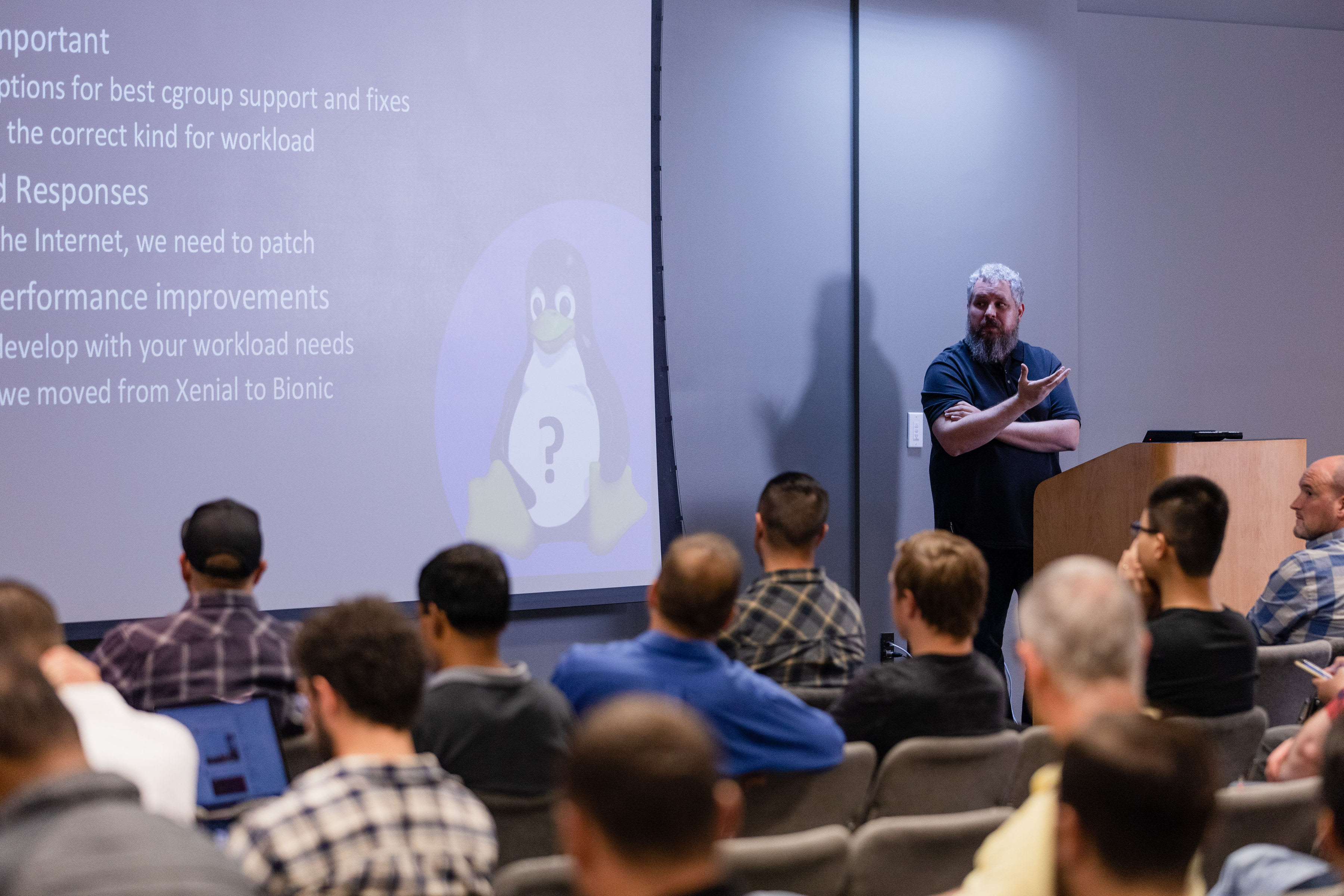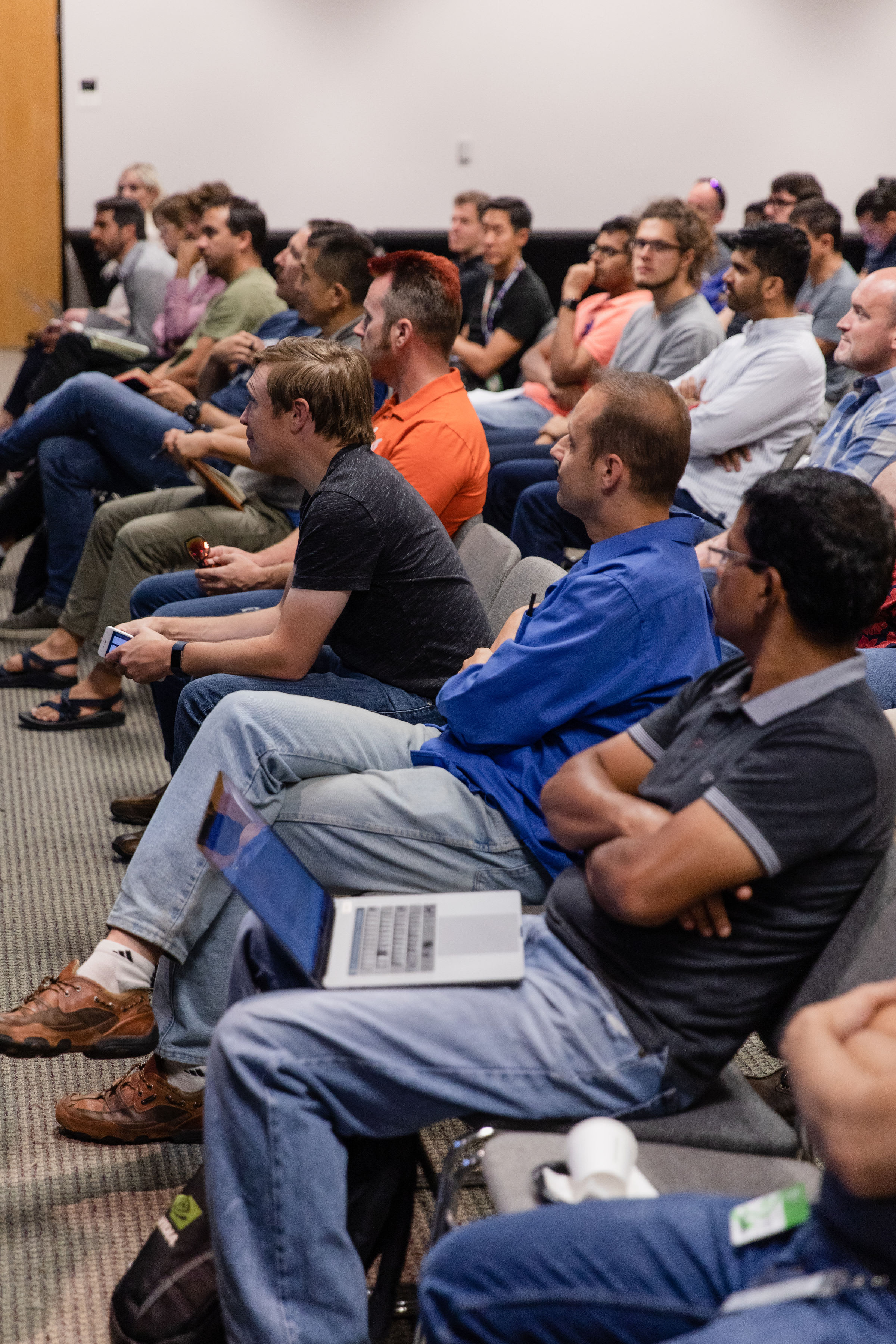Katie Elston
on 28 October 2019
The inaugural Ubuntu Masters event brought together leaders from some of the world’s most exciting companies to talk about their infrastructure challenges and how they’re relying on open-source innovation to solve them.
Comprised primarily of engineers and developers, the group convened at the NVIDIA campus in Santa Clara, CA, on October 8th to listen to speakers from Netflix, Adobe, Roblox, NVIDIA, and Canonical. The event was a unique opportunity for attendees to ask questions, share their own experiences, and network, while hearing about specific use cases from the keynote speakers.
The gathering took place as Ubuntu approaches a milestone — the 15th anniversary of the first Ubuntu release this month. Stephan Fabel, Director of Product at Canonical, said Ubuntu has become one of the most powerful and flexible platforms available today for a wide range of modern applications in the data center and cloud, including artificial intelligence (AI) and machine learning (ML), robotics, the Internet of Things, edge computing and more.

Brendan Gregg, Senior Performance Architect at Netflix, discussed a new type of software that is available in Ubuntu and used by the streaming giant and other companies, including Google and Facebook: Extended BPF, a souped-up in-kernel runtime for executing a virtual BPF (Berkeley Packet Filter) instruction set.
Brendan explained how BPF was changing a 50-year old model of operating systems where syscalls were the only application interface into the kernel. BPF has added a whole new interface, a BPF helper API, that exists in parallel to syscalls. This BPF API is used by new kernel-mode applications that run in the BPF execution environment. “It is a new type of software,” he said, “it is changing how we use and think about systems.” The new BPF software Netflix is developing is helping them with capacity planning and security analysis.
Among the capabilities coming to extended BPF, according to Brendan: a new class of custom, efficient, and production-safe performance analysis tools; more device drivers; new monitoring and intrusion detection systems; TCP congestion controls; and CPU and container schedulers.

Joe Sandoval, Site Reliability Engineering Manager at Adobe Ad Platform, discussed his company’s approach to scale and deliver applications with high performance and no friction for a fully automated infrastructure experience. Adobe uses Ubuntu as the building block for a diverse infrastructure that includes six data centers across three continents and the public cloud. Traffic volume exceeds 200+ billion requests per day, with huge datasets comprised of billions of objects to store (and these numbers have increased since last recorded).
Joe said C-level and other leaders at companies worldwide are afraid of missing out on cloud advancements – he called it cloud-native FOMO – and Adobe is focused on using Ubuntu, Kubernetes, OpenStack and other open-source technologies to build a stable, feature-rich platform that developers can build their services on and that customers can rely on.

Rob Cameron, Technical Director for Cloud Services at Roblox, the online and game creation system platform, delivered a presentation titled “How Roblox Went from Windows to Ubuntu Globally in 7 Days Using MAAS.”
Roblox, he said, decided to move its game servers to Linux to reduce the licensing costs it was experiencing with Windows and to enhance capabilities for players.
As part of the migration, Roblox also containerised workloads, reinvented its deployment model, and standardised on Ubuntu – all to serve the goal of a better experience for Roblox’s 100 million monthly active users.

This was no small feat – it included approximately 200k containers, 5k orchestrated hosts and a clear path to full orchestration. Rob credits MAAS as a key component for making this possible due to the infrastructure capabilities. An updated and flexible kernel, and a regular release cadence with reliable performance improvements were also important factors.
Charlie Boyle, NVIDIA’s VP and GM of DGX systems, talked about how NVIDIA’s DGX operating system — an optimised version of Ubuntu and tuned specifically for the DGX hardware.
For large-scale clusters, the DGX POD management software is composed of various services running on the Kubernetes container orchestration framework for fault tolerance and high availability.
As Charlie put it, leadership in AI requires leadership in AI infrastructure. Building increasing complex AI models requires the right tools, and NVIDIA’s reliance on advanced, open-source-based technologies, he said, is enabling it to break records in AI performance.

Canonical’s Stephan previewed capabilities in Ubuntu 19.10 release (Eoan Ermine) – the 31st Ubuntu release. These include a major focus on security for the stack and OS, support for ACRN hypervisor, GCC hardening, a kernel self-protection project, and fastest-ever desktop performance. You can register here to learn more about what’s new in Ubuntu 19.10.
Stephan also described how NVIDIA is using MAAS and Juju Charms in a proof of concept from Canonical to enable zero-touch, 100 percent automated server provisioning.
The first Ubuntu Masters event was a treasure trove of ideas for doing infrastructure right. And it’s just the start. Stay tuned for info about future events! And, look out for videos from the event coming soon.




